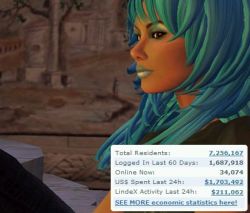Second Life to see new sites in Asia

According to Linden Lab CTO Cory Ondrejka, the company is keen to find secondary hosting sites in Asia and Europe to cope with the growth of Second Life, a virtual community where its residents create their own content that can be bought, sold and traded with other residents.
Catch ZDNet Asia's interview with Linden Lab CTO Cory Ondrejka who explains why Asian businesses should care about the virtual world.
In Singapore as a speaker at the iX conference this week, Ondrejka told ZDNet Asia that Second Life is growing at an average rate of 20 to 40 percent each month and is seeing this growth accelerating in the international markets including Asia.
In fact, only 28 percent of residents in Second Life are currently from the United States, he said. "So the vast majority of our usage is overseas [and] because of that, we need to start hosting servers in foreign markets," he revealed. To date, the virtual world has some 7.2 million residents worldwide.

"This isn't going to create a different Second Life," Ondrejka explained, noting that parts of the virtual world will be "closer" instead to residents. This would address any latency issues, so users in this part of the world will not experience a time lag--especially when the network is congested--when they access Second Life's server infrastructure, he said.
"For us, being able to deploy servers both to Europe and Asia is a critical next step for us," Ondrejka said. "We have some architectural changes we need to make in order to allow that, but we're working on that right now."
His team is also focusing the majority of its development effort on handling the stresses due to scaling of the network. In a town hall meeting last month to address concerns over performance issues and grid stability in Second Life, Ondrejka underscored the importance of scalability as the virtual community continues to expand.
"What's key in all the decisions we make at this point is how do we keep Second Life scaling, how do we keep growing our ability to handle not just the number of residents we have today, and not just twice, but 10 or 50 times the number of residents," he said. "And it's all about looking at how the Web has been built, looking at what standards exist that we can leverage and be more interoperable with the Web, and use the same sorts of reliability and resilience tracks that the Web has used in making Second Life run better."
With millions of people using the virtual world and transacting millions of dollars worth of transactions, Linden Lab recognizes that stability and reliability are critical components in Second Life, he added.
"A lot of companies are using it as a place of real-life business, and if it's not available to them, that's a problem," he said.
Maintaining a peaceful coexistence
Problems could also arise in a world that so closely reflects the real world, where business deals can go sour and transactions can go bad. Earlier this month, a Pennsylvania, United States, judge ruled that a lawsuit against Second Life should be allowed to proceed to trial. The lawsuit was filed by a former resident, who alleged that Second Life had unfairly confiscated his 'virtual' possessions worth some US$8,000.
Ondrejka was unable to comment on this trial as the lawsuit is still pending.
However, when asked how the company is looking to address concerns over disagreements among Second Life users, he said: "When residents are creating deals between each other, a lot of times, they figure out ways to resolve disputes themselves.
"When you're dealing with digital items, you're not dealing with products in the real life in which it's an alienable object, so if you buy it, then I don't have it," he explained. "In the digital world, you're always buying copies. So a lot of transactions are more reversible than transactions in real life, which may make dispute resolution easier [to achieve]."
But, Ondrejka noted, Linden Lab's role here is to provide as many tools as possible to allow for the different communities, groups and jurisdictions in Second Life to create the laws and rules they need to manage their businesses and communities.
He added that residents use the virtual world as a communication platform to do business, similar to how they do business over the telephone or Internet. "The law that applies [then] is real life laws, and it doesn't matter if you're doing the deal in Second Life," he said.